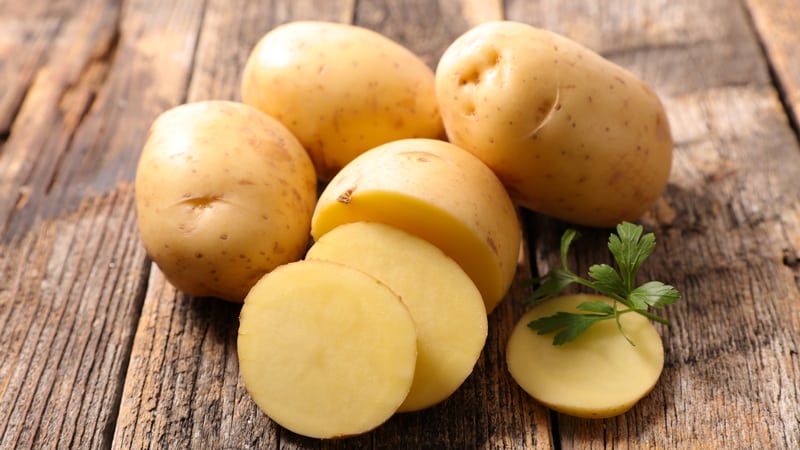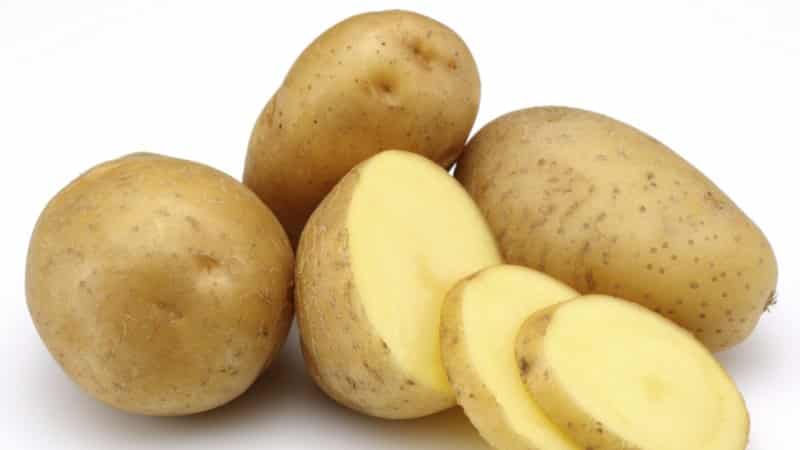What does raw potatoes help with and can you eat them?
Potatoes are rarely eaten raw: few people like them taste. In addition, it is considered difficult to digest, although the vegetable is not toxic in nature and contains a large amount of vitamins and minerals. The resistant starch in its composition is not absorbed by the body, but this compound provides energy to beneficial intestinal bacteria.
Is it possible to eat raw potatoes?

The most useful tubers are those with yellow skin: they contain a lot of carotene. Potatoes are rich in vitamins from June to December. Young vegetables in June-July are especially tasty and juicy, but they are eaten only if it is known for sure that the crop has not been oversaturated with chemical fertilizers.
Nutrients accumulate in the peel, so raw potatoes are eaten unpeeled until winter. The tubers are thoroughly washed with a brush and scalded.
Attention! Potatoes contain solanine, a toxic alkaloid that can cause poisoning. The substance is concentrated under the skin, in the greened areas of the tubers.
From January to March, the vitamin content in vegetables decreases, and the concentration of solanine increases. Therefore, such potatoes must be peeled, and tubers that have turned green, wilted or sprouted (even with broken sprouts) are not eaten.
Who can eat it
Raw potatoes are healthy for adults who do not suffer from gastrointestinal problems: the vegetable contains a lot of potassium (23% of the norm).Vitamins B5, B6, B1, B3, B2 are involved in metabolic processes, normalize the functioning of the nervous and cardiovascular systems, improve intestinal function and skin condition.
Potatoes contain neither fat nor cholesterol. The iron in its composition is absorbed faster due to the high content of vitamin C (24%). Therefore, many vegetarians add raw tubers to their diet.
Peeled potatoes are allowed for children in small quantities, but choose only fresh, thoroughly washed tubers without green areas. It is recommended to add more other vegetables to your child's diet to replenish the balance of nutrients.

What are the benefits of raw potatoes?
Tubers contain many vitamins and minerals that have a beneficial effect on humans. They are especially rich in microelements:
- rubidium - 500% of the daily requirement;
- vanadium - 373%;
- silicon - 167%;
- boron - 164%;
- lithium - 77%;
- cobalt - 50%;
- chromium - 20%;
- iron - 15.5%.
Potassium
Potassium is a vital element in every cell of the body. It regulates water and acid-base balances, creates conditions for the transmission of nerve signals and muscle contractions.
100 g of potatoes account for 23% of the daily potassium requirement. The vegetable contains more macronutrients than bananas, tomatoes, broccoli and oranges.
Vitamin C
This water-soluble vitamin acts as an antioxidant and neutralizes free radicals, preventing cell damage. The substance supports the body's immune system.
Every 100 g of potatoes contains up to 24% vitamin C. Most of the ascorbic acid and potassium are concentrated in the pulp.
Reference! When peeling tubers, 16–22% of vitamin C is lost. If you put potatoes in cold water during cooking, up to 30–50% of vitamin C will be destroyed due to oxidation, and up to 25–30% in boiling water.
Alimentary fiber

Insoluble fiber contained in potato peels supports proper intestinal function and peristalsis, and reduces cholesterol levels in the blood. 100 g of vegetables provide 7% of the daily fiber requirement.
Vitamin B6
This water-soluble vitamin plays an important role in carbohydrate and protein metabolism:
- participates in amino acid metabolism;
- promotes detoxification of the body;
- necessary for hemoglobin synthesis.
100 g of tubers contain up to 15% vitamin B6.
Vitamin B1
Thiamine is involved in the breakdown of carbohydrates and supports the functioning of the nervous, muscular, cardiovascular and digestive systems. Increases mental performance, improves appetite.
100 g of product contains 8% vitamin B1.
The nutritional value
Composition of 100 g potatoes:
- 74 kcal (4% of normal);
- 1.94 g protein (3%);
- 0.33 g fat (0%);
- 16.79 g carbohydrates (6%).
Raw potatoes contain fewer calories, proteins and carbohydrates than cooked potatoes, but more ascorbic acid.
Harm and contraindications
Raw potatoes can bring not only benefits, but also harm:
- Antinutrients (trypsin inhibitor protein and lectins) interfere with the absorption of nutrients, but for people with a balanced and varied diet they will not be a problem.
- Tubers contain a poisonous glycoalkaloid solanine. In unfavorable conditions, when damaged, plants produce more protective substances. When exposed to sunlight, vegetables turn green due to the pigment chlorophyll, but at the same time the level of glycoalkaloids also increases.
- Stable starch in potatoes it supports intestinal microflora, but a large amount of it in tubers (up to 17 g) can cause digestive problems.
Raw potatoes are contraindicated in cases of exacerbation of diseases of the digestive system, gastritis and ulcerative lesions against the background of low acidity, severe forms of diabetes.
Application
Raw potatoes are used in folk medicine and cosmetology.
For gum diseases
Vitamin C contained in potatoes strengthens teeth and gums.
The raw tuber is thoroughly washed with a stiff brush, doused with boiling water, and grated along with the peel. The resulting mass is applied to the inflamed gums for 20–25 minutes. Repeat three times a day.
For arthritis
Ascorbic acid in vegetables helps absorb calcium, has antioxidant properties, and is involved in the production of collagen. Potassium removes harmful salts.
To relieve the symptoms of the disease, peel 1 large potato and finely grate it. The resulting slurry is mixed with 250 ml of kefir. The finished product is consumed orally for the first 10 days, 1 tbsp. before meals, the next 10 - the same, but every other day, the last 10 - every 2 days. Course - 2 months.
For cancer
Raw potato juice is a strong antioxidant that prevents free radical damage to cells and thereby reduces the risk of cancer. For prevention, drink 1-2 tbsp every day. such juice.
During pregnancy
100 g of raw potatoes contains up to 11% of the daily requirement of folic acid, which promotes the development of the fetal nervous system. The vegetable is a source of iron, magnesium, potassium and calcium, which are involved in the growth and development of the child. The main source of energy for the fetus is glucose (4.2% per 100 g of product).
Pregnant women are allowed to eat raw potatoes in moderation (no more than 250 g per day).
For heartburn

Raw potatoes are an alkaline product that helps with high acidity:
- A small tuber is cut into small pieces without peeling.
- Grind them in a blender.
- Drink strained juice 2 times during the day to get rid of heartburn.
For bags under the eyes
The vegetable contains the enzyme catecholase, which whitens the skin and removes dark circles under the eyes. To do this, the tuber is ground on a grater, and the resulting pulp is applied under the eyes for 5 minutes. The procedure is performed daily.
For weight loss
Proteinase inhibitors in tubers suppress hunger and slow down digestion. The potato diet is rich in nutrients, including fiber.
It is not recommended to carry out a mono-diet on raw potatoes - the vegetable is boiled.
Diet rules:
- eat only boiled potatoes for 3–5 days;
- eat 0.9–2.3 kg of vegetables daily;
- exclude seasonings, salt, ketchup, butter, sour cream and cheese;
- drink only water, green tea or black coffee without sugar;
- heavy physical activity is replaced with light exercise and walking.
Other

Grated green potatoes are applied externally for muscle pain and skin problems. Solanine, when applied externally, has an antispasmodic effect and relieves inflammation. The cooling effect of the raw slices provides quick relief from itching caused by contact dermatitis and insect bites.
Doctors' opinions
The main source of concern associated with eating raw potatoes is the toxic glycoalkaloid solanine, which in large quantities causes headaches, nausea, diarrhea and in some cases even leads to death. That's why doctors recommend avoid eating green tubers, and include raw vegetables in your diet only in moderate quantities (no more than 250 g per day).
Conclusion
Eating raw potatoes in moderation is beneficial for the body: the tubers are rich in microelements, vitamin C, potassium, and dietary fiber, which have a beneficial effect on all organ systems. It is important to exclude green vegetables from the diet, wash and scald the product thoroughly.